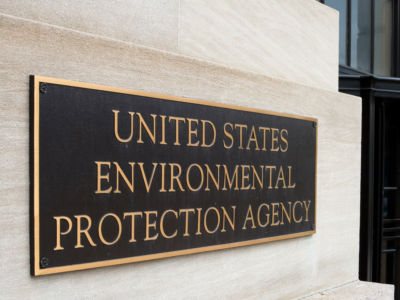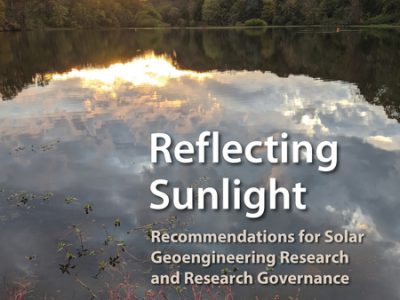Environmental Science
Dissecting the Attacks on the Endangerment Finding
EPA has identified four different arguments against the endangerment finding. None have merit.
In late 2009, EPA made a formal finding — often called the Endangerment Finding —that greenhouse gases may endanger human health and welfare. Undaunted by the overwhelming scientific evidence in favor of that finding, the Trump EPA plans to reconsider that finding. Few independent observers believe EPA will succeed, but the issue is important enough to warrant a close look. Here’s a deep dive.
CONTINUE READINGWhat is Life Like Inside Trump’s EPA?
Three EPA employees talk about DOGE, work anxiety, regulatory rollbacks, and the impact on protecting health and the environment.
The new head of the U.S. the Environmental Protection Agency — whose mission is to protect human health and the environment by developing and enforcing regulations — this week made what he proudly called the “largest deregulatory announcement in history” in the form of nearly three dozen policy reversals and “reconsiderations.” EPA Administrator Lee Zeldin’s …
Continue reading “What is Life Like Inside Trump’s EPA?”
CONTINUE READINGEPA Jumps the Shark
Just as a past dictator rejected modern genetics, Trump rejects climate science. For both, evidence was no match for ideology and ego.
Honestly, EPA’s embrace of climate denial is just plain embarrassing. And the rest of the world will justifiably view it as one more sign that the U.S. has taken leave of its senses. Trump can change the name of a water body on maps, but he can’t change scientific reality. The scientific evidence about the reality of climate change, its causes, and its harms is incredibly well-established. It’s based on many different types of data and models, which have been tested and retested.
CONTINUE READINGU.S. Resistance to Trump is Alive and Well
Thousands of people rallied at more than 100 Stand Up for Science events from Missouri to France. Where will the movement go from here?
Several thousands of people took to the streets this past weekend in more than 100 cities to protest the Trump administration’s wide-ranging attacks on vital scientific research, including its attempts to slash funding to the National Institutes of Health and hence local universities and research labs across the country. The result was small but potent …
Continue reading “U.S. Resistance to Trump is Alive and Well”
CONTINUE READINGTracking the Trump Administration
Rollbacks of Climate, Energy, and Environmental Policies and Investments
The first month of the Trump Administration has resulted in a dizzying flurry of actions and reactions. Many of us are wondering how to track the status of these actions, including the legal challenges to these actions. Luckily, a number of institutions are keeping track of the range of policy and legal actions that are …
Continue reading “Tracking the Trump Administration”
CONTINUE READINGTrump Shoves Economic Analysis and Science to the Curb
The MAGA agenda takes precedence over data and analysis.
If you were looking for data-driven regulatory policy, you’re not going to find it in this Administration. On the contrary, Trump has marginalized economic analysis and wants to bulldoze environmental science. Thus, we are likely to get policies that are bad for the environment without being cost-justified, while ignoring policies who environmental benefits outweigh economic costs.
CONTINUE READINGLA Fires and the Climate Connection
New UCLA research connects the dots between the climate crisis and the supercharged LA wildfires. “Hydroclimate whiplash” means worse floods, droughts, and fires.
Like millions of Angelenos, I’ve been staying indoors and off the roads, glued to the Watch Duty app, radio, and TV coverage as LA is engulfed by these historic fires. The last 48 hours of coverage has focused, understandably, on the firefight and immediate devastation. Now, it’s time to start hearing about the climate connection, …
Continue reading “LA Fires and the Climate Connection”
CONTINUE READINGNo, Virginia, There is No Sanity Clause
A dangerous hallucinatory thread runs through today’s public discourse.
Unlike politicians and influences,even the most extreme federal judges feel compelled to make actual arguments for their positions and don’t attribute events to supernatural forces or bizarre conspiracies. They may be dead wrong – and often are in my opinion –but they still live in the world of rational discourse. Too many people in the public sphere seem to have left that realm behind whether the subject is public health or climate change.
CONTINUE READINGThe 2024 Election Outcome Could Boost the Case for Geoengineering
A Trump victory would increase the odds that we will ultimately need to start blocking solar radiation as a last resort to limit climate change.
A Trump victory would increase the odds that we will eventually need to “break the glass and pull the red lever.” To be prepared for that possibility, we would also need to do more in the short term to research various forms of geoengineering, their feasibility, and their potential side effects. Basically, if you decide you’re going to start smoking a lot more cigarettes, you need to be prepared for the greater likelihood you’ll need chemo.
CONTINUE READINGThe Dangerous Embrace of Convenient Narratives Over Inconvenient Truths
As it turns out, Nature doesn’t care what stories you post on social media or spin on TV.
When lying becomes seen as legitimate political discourse, we’re in deep trouble. It’s short step from blaming people for imaginary crimes to rounding them up and or using force to stop them. That’s why climate scientists get death threats. And yet, whatever threats are made or carried out, reality will remain what it is. You can denounce climate change as a Chinese hoax, but that won’t stop the warming waters of the Gulf from sending incredible storms your way.
CONTINUE READING











